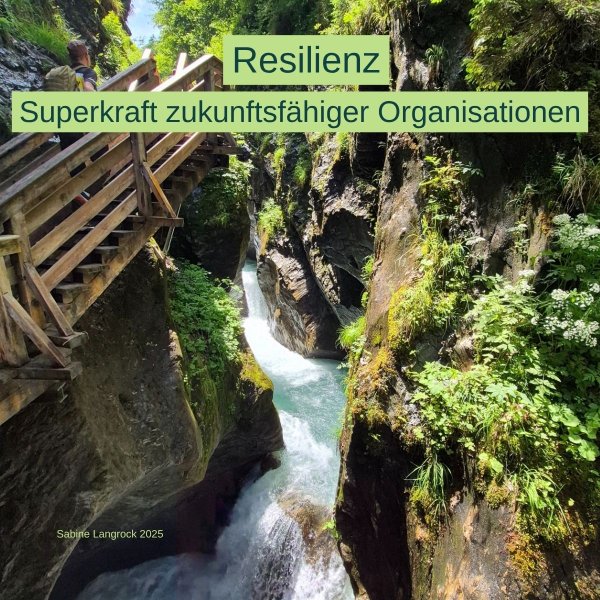- How do I act more confidently and calmly in crises and stormy times?
- How do I develop creative approaches to dealing with mental tension and emotional stress?
- And can resilience actually be learned?
During the Corona crisis, we have witnessed firsthand what it feels like when our daily lives are turned upside down and nothing seems normal anymore. The loss of security, orientation and belonging leads to worry and stress. And even though the individual reaction may differ from person to person, it is hard to avoid the challenges of a crisis mentally and emotionally.
- But how do we manage to deal with these situations constructively?
- How can we remain calm and capable of acting despite all the uncertainty and stress?
- How do we maintain our energy and creativity in stressful situations?
- And how do we, as managers, provide orientation to our employees in a crisis?
For many years, resilience research has been investigating which internal and external conditions are helpful in order to emerge from a crisis healthy and, in the best case, even internally strengthened.
Resilience is one of the key competencies of our time.
The good thing is: resilience can be trained, both for individuals and for teams - in workshops, coaching sessions and modular programs.
Strengthen yourself or your employees with my customized solutions. This enables you to cope with crises or phases of high stress with energy and mental health.

Resilience
The superpower of future-proof organizations
For a long time, #resilience was a bit like back training: you know it's important, but you usually only think about it when it already hurts.

Glimmers
Micro-moments of comfort and connection
A ray of sunshine on your face. The smile of a stranger. The scent of spring in the air.

Bad decisions? Irritability? Creativity slump?
Maybe it's not your working method, but your sleep.
Today's #WorldDayOfSleep is the perfect opportunity to take a critical look at your #eveningroutine.

Celebrate World Happiness Day
The six pillars for mental well-being
Today is #WorldHappinessDay! ???? A perfect occasion to think about what makes us sustainably happy and content.
Psychology professor Carol D. Ryff, a pioneer in the field of mental satisfaction, identified six central pillars for mental well-being back in 1989 ????

La dolce far niente
Maintower tv feature on the Day of Doing Nothing
La dolce far niente
What inner images does the Italian term for doing nothing evoke in you?

How does my encounter with alpaca Gustav relate to mental health?
Mental health is absolutely essential to our overall well-being: "There is no health without mental health" (WHO). And it is also something we should never take for granted.

Vom Wert kleiner Auszeiten
Gerade in Zeiten wie diesen sind kleine Auszeiten besonders wertvoll. Denn das hilft, die eigenen Ressourcen zu stärken und das innere Gleichgewicht wieder herzustellen. So war ein Wochenende in einem buddhistischen Kloster im Odenwald genau die Auszeit, die ich gerade gebraucht hatte. Und mit Qi Gong, achtsamem Laufen und Meditationen konnte ich mich wieder neu zentrieren…

Digital Detox: Onlinestress reduzieren.
Sind Sie auch mehr online als offline? Das Smartphone ist das Letzte, was Sie vor dem Schlafengehen aus der Hand legen bzw. das Erste, wonach Sie morgens greifen? Dann ist es Zeit für Digital Detox!

Kurzfristiges Glück oder langfristige Zufriedenheit
“Emotionale Zustände sind wichtige Botschaften an uns selbst.” Der Neurobiologe Gerald Hüther spricht in diesem Interview über die Bedeutung von Emotionen und den Unterschied zwischen kurzfristigem Glück und langfristiger Zufriedenheit.

Gedanken sind nichts als Gedanken
Ertappen Sie sich auch manchmal dabei, sich in einer negativen Gedankenspirale zu verlieren, die Ihren Stress verstärkt?
Überprüfen Sie doch das nächste Mal Ihre Annahmen, die diesen stressverschärfenden Gedanken zu Grunde liegen. Denn Gedanken sind nichts als Gedanken.

Muße verringert Stresserleben
In einer Studie des Psychologen Prof. Dr. Stefan Schmidt und des Neurobiologen Prof. Dr. Joachim Bauer an der Universität Freiburg wurde deutlich, dass mehr Muße mit einer höheren Lebenszufriedenheit und einem geringeren subjektiven Stresserleben einhergeht. Doch was genau ist Muße? Und wie kann sie in unserer Multioptionsgesellschaft entstehen? Antworten auf diese Fragen gibt Stefan Schmidt in diesem Interview in report-psychologie.

Power Posing
Wussten Sie, dass schon zwei Minuten in einer so genannten „Macht-Pose“ die Ausschüttung von Hormonen in unserem Gehirn derart beeinflusst, dass wir uns danach tatsächlich selbstbewusster fühlen?
Inspirierender TED-Vortrag der Sozialpsychologin Amy Cuddy über den Zusammenhang zwischen Körpersprache und Bewusstsein (deutsche Übersetzung verfügbar).

